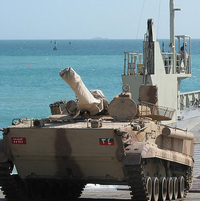While Western diplomats and sanctions-enforcers ply their trade to pressure Iran into stopping its uranium enrichment, much of the Middle East is already preparing for war. Headlines might focus on United Nations resolutions initiated by Western powers, or on fiery speeches delivered by Iranian President Mahmoud Ahmadinejad. But just a few hundred miles from Tehran, the Arab countries of the Persian Gulf have launched a race to arm themselves with an urgency and intensity reminiscent of America's defense build-up prior to its entry into World War II.
The magnitude of the weapons purchases is nothing short of astounding and the speed at which they are accelerating is breathtaking. Consider how fast the orders are growing: Gulf nations, including Saudi Arabia, the United Arab Emirates, Bahrain, Qatar, Oman and Kuwait, bought $37 billion worth of U.S. weapons in the last four years, with the majority of the purchases coming in just the last two years. And the deals already under negotiation for the next four years are expected to total $123 billion. Those numbers don't include arms purchases from countries other than the U.S.
By far the largest component of the newly muscular Arab arsenal comes in one package deal for Saudi Arabia, approved by the White House and headed for approval by the U.S. Congress. The Saudi purchase, with an 11-digit price tag of $67 billion, is the biggest arms deal in history.

